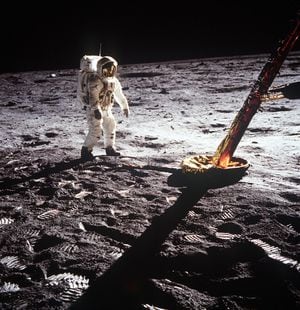Apollo 11 – Day Five
APOLLO 11. DAY FIVE. JULY 20, 1969

..............
"Houston, Tranquillity Base here. The Eagle has landed."
The passing of 50 years has not dimmed how great that moment was.
Men had landed on the moon in the greatest voyage of exploration of all time.
History was made at 9.17pm British summer time on Sunday, July 20, 1969.
Television viewers spellbound during the final descent were unaware of the high drama as Apollo’s lunar module came in.
Neil Armstrong and Buzz Aldrin received repeated alarms which they did not recognise from their training. After assessment – they indicated an overloaded computer – Houston gave the go-ahead to land.
And the lander overshot and was facing a boulder-strewn moonscape. Armstrong, a former test pilot, took control manually and with only around 20 seconds of fuel left landed safely, with his heart pounding at 150 beats a minute.
"You got a bunch of guys about to turn blue. We're breathing again. Thanks a lot," radioed Charlie Duke from the Houston control.
Four miles from the intended touchdown point, Armstrong was lost, not that it mattered.
"Houston, the guys that said that we wouldn't be able to tell precisely where we are, are the winners today," he said.
The astronauts were supposed to sleep before walking on the moon, but couldn't wait, and started early.
In Britain it was just before 4am on July 21 (still July 20 in the US, which is why that date is often given for the moonwalk) that children were woken from their beds to watch the epic event live, with a fuzzy picture of Armstrong descending the ladder of the lunar module.
His touchdown had been so gentle that there had been no compression in the spidery landing legs of Eagle, which meant the bottom of the ladder was still some way off the lunar surface.
"I'm going to step off the LM now," said Armstrong.
"That's one small step for man." Pause. "One giant leap for mankind."
As he set foot on the moon, he uttered some of the most famous words ever spoken. They were his own. Nobody had scripted them for him.
There have been endless debates since which have never really been resolved.
Did he mean to say "a man"? Indeed, did he actually say "a man" and the indefinite article was lost in static?
Did he come up with the quote during the journey, or before the mission left Earth, as was later claimed by his brother?
For technical reasons to do with bandwidth, the television pictures from the surface were beamed back in black and white, rather than the colour for other transmissions.
An estimated 650 million people watched. For the first time in the history of exploration, the whole world had a grandstand seat at the moment of discovery.
In Britain, it was the first all-night television broadcast. Sadly much of the BBC and ITV footage has been lost, due to the contemporary practice of wiping recordings.
Armstrong was joined on the lunar surface, where gravity was one sixth that of Earth, by Buzz Aldrin, who surveyed the scene.
"Magnificent desolation," Aldrin said simply.
In their two and a half hours walking on another world they planted the American flag, collected moon rock, and set up a number of experiments, before returning to the lunar lander.
Eagle was in two parts, the ascent stage with the crew compartment, and the descent stage below it.
Had the small rocket on the ascent stage failed to fire, Armstrong and Aldrin would have been marooned on the moon. Michael Collins, orbiting in the command module, would have been powerless to save them.
It worked. They were coming home. All of them.
For a moment Apollo 11 seemed a springboard to yet greater achievements and exploration. A lunar community perhaps, a mission to Mars maybe.
Another 10 men were to walk on the moon, amid waning public interest. After all, there can only be one first time.
The NASA budget was slashed, and the last three Apollo missions were cancelled.
The plaque left by Apollo 11 reads: "Here men from the planet Earth first set foot upon the moon. July 1969 A.D. We came in peace for all mankind."





